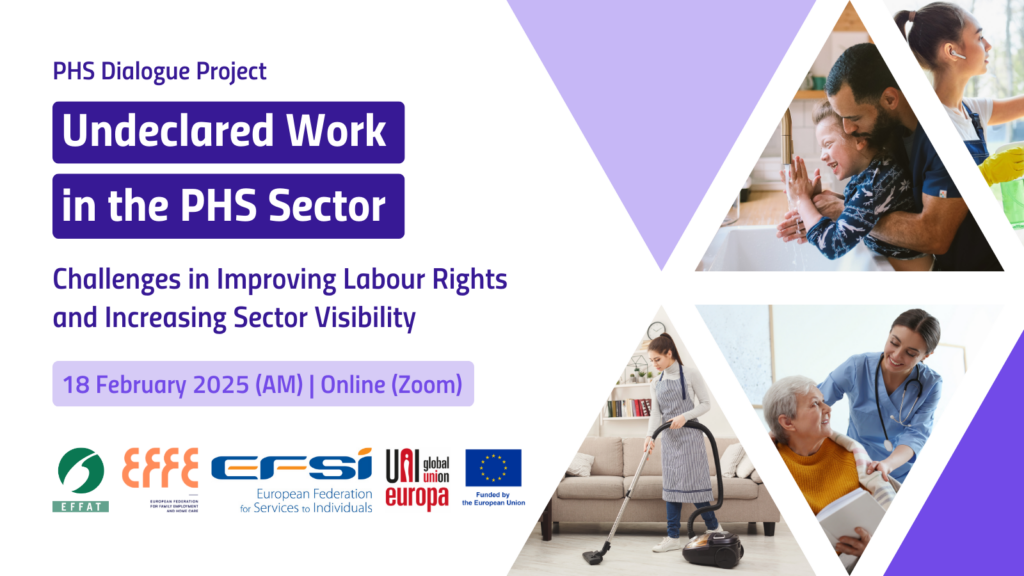On the 18th of February 2025, EFFE organised together with the three other EU PHS Social Partners – EFFAT, EFSI and UNI Europa – an online Webinar on “Tackling Undeclared Care Work in Personal and Household Services”. It came at a crucial moment, as there is a lack of data available at EU-level regarding this issue and misunderstanding about the definition of undeclared work, which prevent effective solutions.

In this respect, Eurofound, the EU Foundation for the Improvement of Living and Working Conditions, will publish next March a report on undeclared care work in the EU. PHS social partners took this opportunity to organise this Webinar to hear the recommendations of the agency.
The event gathered nearly 200 participants and panellists from national and EU agencies and from EU institutions, demonstrating the strong interest and commitment to improving the sector.
Marianna Baggio, Research Officer on Social Policy at Eurofound, presented findings from the upcoming report on undeclared care work in the EU. The study highlights the urgent need for a clear definition of undeclared care work and stronger measures to improve working conditions. The results will be published in March on this page.
In light with recommendations of Eurofound, national experts shared effective solutions. Representatives of employers and trade unions in Belgium, France and Italy agreed that expanding support for training, fiscal incentives and social vouchers is key to making declared care work more attractive than undeclared employment. Zied Chaker, Policy advisor at the French Observatory of Domestic & Homecare (France), declared that French support policy to direct employment through tax incentives contributed to reduce the cost of declared work compared to undeclared work.
EU policymakers discussed targeted political solutions at the European level to tackle undeclared work and its consequences on social rights. MEP Idoia Mendia stressed the importance of accessible and affordable care services, and the need of recognising domestic work as a profession. She called for a clear definition of undeclared care work at EU-level and reminded some progress still to be done for this very feminised sector.
Kostas Koutsogiannis, Expert at the European Labour Authority (ELA), highlighted the work of labour inspectors to ensure that care work remains a quality job in all Member States. Davide Colombi, Researcher at the Centre for European Policy Studies, deplored that irregularised migrant people are often forced to resort to undeclared work and called for improving mobility across Europe and prioritising the establishment of legal pathways.
Claire Hobden, Specialist on Domestic and other Vulnerable Work at the International Labour Organisation (ILO), emphasized that households need support to afford quality care services and that domestic work—especially indirect care—must be recognized as a formal professional sector. Social dialogue enables household employers to have a voice in Europe, which is still very rare in other parts of the world.
Finally, Francesco Corti, from the Cabinet of Executive Vice-President Roxana Mînzatu, underlined the importance of data collection on undeclared work and the importance of measuring return on investment in the PHS sector. He stressed the commitments of the European Commission to support Member States in their measures for incentivising the sector and developing care economy.
All participants shared the conviction that collaboration between all stakeholders is essential to ensure fair work, better rights, and a stronger future for this vital sector.
EFFE will continue its work with the three other PHS Social Partners at EU-level to strengthen social dialogue and find synergies to combat undeclared care work. EFFE thanks all the participants for their inspiring messages and their willingness to cooperate to strengthen PHS sector.